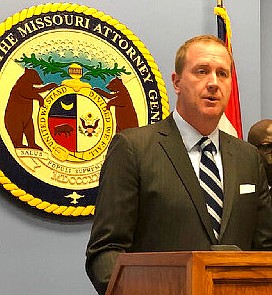The Missouri Attorney General's Office will soon update the state's inventory of rape kits, a process that would unlock a new phase of the SAFE Kit initiative.
The Attorney General's Office began an effort to catalog and test the state's backlog of rape kits in 2019 as part of a national undertaking supported by the Bureau of Justice Assistance and U.S. Department of Justice since 2015.
After creating an initial inventory in 2019, Missouri received a federal grant to begin shipping the kits off to labs to be tested for DNA evidence. Phase 2 of the initiative is to create a second inventory of rape kits picking up where the last inventory left off and adding partially or previously tested kits.
In a news release Monday, the Attorney General's Office announced it was awarding Community Partnership Awards to law enforcement agencies and hospitals that helped complete Phase 2 of the initiative. Ten law enforcement agencies and two medical facilities in Cole County received the recognition.
With Phase 2 winding down, the Attorney General's Office will release a new rape kit inventory report similar to its 2019 one. The Bureau of Justice Assistance will review the report before granting more funds to ship remaining kits to labs for testing. That's the last phase of the initiative.
Missouri secured the second federal grant in 2020, but the updated report is required for the funds to be released.
A spokesperson for the Attorney General's Office could not provide a date for when the report will be issued.
The federal grants aim to help states and local jurisdictions catalog and test sexual assault forensic evidence kits, upload DNA results to a national database and prosecute when there's a DNA profile match. It also helps state and local governments develop procedures and the capacity to prevent future backlogs.
The 2019 inventory of rape kits found 7,019 kits throughout the state, 6,189 of which were never tested. The number of untested kits corresponding to reported crimes was 4,455.
The 2019 inventory comes from 631 law enforcement agencies, 193 healthcare providers and four ancillary organizations. More than 67 percent of the rape kits in the inventory involved female victims, 5.4 percent involved male victims and 27 percent involved victims of unknown sex.
There were 76 inventoried kits coming from Callaway County in 2019, none of which had been tested. All but two kits were associated with a police report and the victim initiated a criminal investigation. The other two came from Fulton State Hospital. None were tested.
The Callaway County Sheriff's Office had the most tests collected with 38, followed by the Fulton Police Department with 34 tests and Holts Summit Police Department with two tests.
To prevent overwhelming the Missouri Highway Patrol Lab, the Attorney General's Office contracted with several private forensic labs to conduct kit testing. The Highway Patrol Lab reviews results and uploads them to the federal DNA database.
As of April, the state had sent 3,298 kits to labs for DNA testing and 1,312 were returned; 500 of the tested kits were eligible for the national database and 201 of those produced matches in the system. There were 353 kits that were ineligible to be uploaded to the national database and 459 kits in which no DNA could be found.
About 1,500 of the kits were shipped using the federal grant and the rest were shipped using $2.6 million the state Legislature kicked in for the effort.

